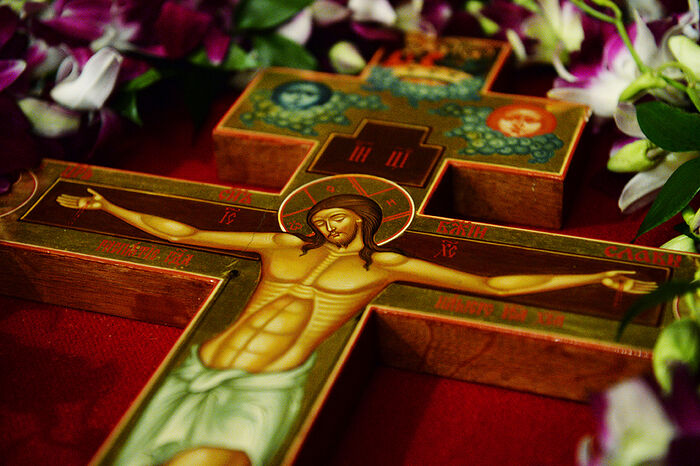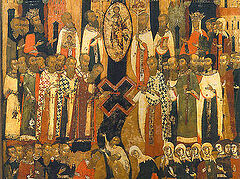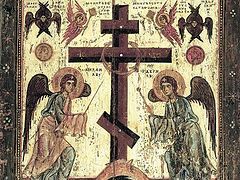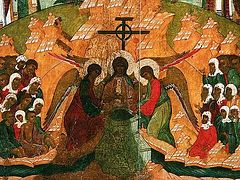The Cross is the guardian of the entire universe,
The Cross is the beauty of the Church,
The Cross is the might of kings,
The Cross is the affirmation of the faithful,
The Cross is the glory of angels and a plague to demons.
In the name of the Father, and of the Son, and of the Holy Spirit!
Dear brothers and sisters in Christ, today the Church glorifies the power of the Life-giving Cross of the Lord, and also remembers the honorable sufferings that our Lord Jesus Christ endured upon the Cross. The immediate cause for today’s celebration is the miraculous signs revealed from the Wood of the Life-giving Cross to the inhabitants of Constantinople.
In ancient times, a severe pestilence broke out in Constantinople, the capital of the Greek state, which claimed many human lives. After the Wood of the Cross of the Lord was carried through the streets of the capital with prayers and the sprinkling of buildings and homes with holy water at the request of the faithful, the deadly disease stopped, and all Christians offered the deepest thanksgiving to the Lord Jesus Christ.
Later, another significant event was added to this miracle, namely that by carrying icons of the Savior and the Mother of God before his soldiers, the Orthodox Greek Emperor Manuel defeated the Saracens. At the same time, the Orthodox Russian Prince Andrei Bogolyubsky also defeated the Volga Bulgarians, carrying icons of the Savior and Mother of God. That these victories were won by a supernatural power was testified to by the Heavenly radiance emanating from the icons, illuminating the people who were there. In memory of this remarkable event, the Greek and Russian Orthodox Churches decided to add to the feast of the Procession of the Cross the celebration of the All-Merciful Savior and Most Holy Theotokos in memory of the Heavenly mercies granted to both Orthodox countries.
But glorifying now the power of the Life-giving Cross of the Lord, the Church also remembers the sufferings that Christ endured on the Cross. The Gospel appointed for today tells the story of the last hours and minutes of the earthly life of the Son of God. Sinless, the Holiest of holies, having accepted the form of a servant, humiliated and insulted by the noisy crowd of furious enemies around Him, He marches to the judgment of Pilate, a pagan and sinner. The scribes, elders, and all the people, with incomprehensible hatred, demand that the ruler give death to the Immortal One—a shameful death: Crucify Him, crucify Him! (Jn. 19:6), they shout.
Pilate, a pagan, not knowing the Divinely revealed teaching, but moved by a sense of justice, hesitates; he wants to save Him, telling the Jews: Take ye Him, and crucify Him: for I find no fault in Him (Jn. 19:6). But their threats to accuse him before Caesar force Pilate to betray the Lord into the hands of His enemies. And after many new humiliations and affronts, the innocent Sufferer, acquitted at Pilate’s trial, ascends to Golgotha, where He is nailed to the Cross and gives up His spirit, hanging amidst two thieves on a tree. What a humiliation, what a terrible death the Lord suffered at that time! And the question is: Why was such a terrible sacrifice required?
But He was wounded for our transgressions, He was bruised for our iniquities … and with His stripes we are healed (Is. 53:5), the holy Prophet Isaiah answers. The whole of mankind abode in sin. By the time of the Savior’s coming, people had forgotten God; even the Jews who had been entrusted with preserving the Divinely revealed teaching had forgotten His Divine law and the prophets. All have sinned, all have transgressed the commandments of God, and therefore all have angered God and deserve eternal damnation and death. God is all-good and all-merciful, but He’s also infinitely righteous. The Divine Truth was indignant against human untruth, human sins. It was necessary to satisfy this holy Truth. Of the people infected with sin, none could take up the feat of redeeming mankind, because our sins were exceedingly great, and according to the severity of our sins, the sacrifice had to be the greatest. And this greatest and holiest sacrifice was the Son of God. For God so loved the world, that He gave His only begotten Son, that whosoever believeth in Him should not perish, but have everlasting life (Jn. 3:16). By the Savior’s death on the Cross, we are redeemed from sin, damnation, and death. The blood of the Innocent One was shed on the Cross, that the guilty might escape the deserved wrath of God: With His stripes we are healed… Christ died for our sins (Is. 53:5, 1 Cor. 15:3). What goodness and what unspeakable mercy of God to us sinners!
He Who was nailed to the Cross and shed His most pure Blood became an eternal Intercessor for us before God the Father. His wounded hands lovingly embrace the whole of mankind and bring all to the Father who desire it. That which separated the Creator from the creature, God from men, the Heavenly Father from the rebellious sons of men, was destroyed by the Golgotha Sacrifice. The sting of death has been deadened, the gates of hades have been crushed, the power of the devil has been destroyed, the faithful have been granted freedom, and the gates of Paradise have been flung open, so that the Cross, the instrument of shameful death has now become for all the faithful a precious, most sacred item, an indestructible weapon in the fight against the enemies of our salvation.
Raised up on Golgotha, it brightly shines over all of creation, warming with its rays our immortal souls that have become cold from our sins and sorrows. Come all to this Cross, look upon it and find true peace. Just as Moses of old raised up the brass serpent in the desert and all who gazed upon it received healing from the serpents’ sting and life, so the Cross of Christ, raised up on Golgotha, grants healing and rest to all our souls stung by sin: And as Moses lifted up the serpent in the wilderness, even so must the Son of Man be lifted up: That whosoever believeth in Him should not perish, but have eternal life (Jn. 3:14-15). Such is the ineffable mercy of God to us sinners that at but one thought about all that Divine love has done for us, the unspoiled human heart is involuntarily filled with the greatest gratitude to the Creator.
Honoring the Holy Cross today, let us, however, remember that our bowing before the Cross of the Lord must consist not only in eternal actions and words, but must also take place in the depths of our soul, our spirit. First of all, we need to realize that He Who was crucified on the Cross is the God-Man, the Creator of the entire universe, and therefore a sense of fear and trembling should embrace our souls when we venerate the Holy Cross.
The Lord, Who was crucified on the Cross for the sake of our sins, desired that we, cleansed from sins by His Blood, would live for truth and be holy in all our lives, and for that be found worthy of eternal beatitude in the Kingdom of His Father. And therefore, if we sin, we’ll be subject to terrible punishment not only for our sins, but also for the Blood of the Son of God, which we trample upon, and for the grace by which we are sanctified in the Sacrament of Baptism and which we have neglected. Are we not crucifying the Lord anew with our sins? Let us guard ourselves from sins and vices however we can and remain faithful to the Lord, mindful that firm faith draws the favor and mercy of God to us.
The Church presents for us today the bright memory of the holy Maccabean Martyrs, who lived a century and a half before the Nativity of Christ, as an example of a steadfast confession of faith in God. It was a difficult time for the Jewish people, when the wicked Syrian King Antiochus Epiphanes, having plundered Jerusalem and slaughtered many thousands of Jews, launched an evil persecution against their faith, aiming to wholly eradicate it. To this end, he commanded the Jews, under pain of death, to give up their burnt offerings and sacrifices and libations in the sanctuary, to abolish their Sabbaths and feasts, to build pagan altars and offer pagan sacrifices there, to abolish circumcision, and generally to change all their previous religious convictions, laws, morals, and the customs of their fathers.
At this time, for the consolation of the Jewish people, the Lord raised up many firm confessors of faith in the true God, who, not wanting to renounce the laws of their fathers, chose rather to die than to be defiled, and bravely endured a martyr’s death. Among them was the ninety-year-old elder Eleazar, the seven Maccabean brothers, and their mother Solomonia.
The tormentors tempted the elder Eleazar with the chance to at least feign to make a sacrifice and thereby save his life, but he, gray-haired and filled with piety, replied: “It’s unbecoming of my age to be a hypocrite in order to save my few remaining days,” and so he was mercilessly tortured.
Likewise, the holy Maccabean brothers, confessing their faith and hope in the future resurrection, bravely accepted a martyr’s death one after another, strengthened by the hope that Lord would revive them in the future life. After all of them, their blessed mother Solomonia also gave her spirit over to the hands of God.
Dear brothers and sisters, with full awareness of all of God’s goodness and mercy to us, let us fall down today before the Precious Cross, this banner of our salvation; with true filial love, let us kiss the most pure feet of the Savior, crying out to Him: Before Thy Cross, we bow down in worship, O Master, and Thy holy Resurrection we glorify!
Amen.




